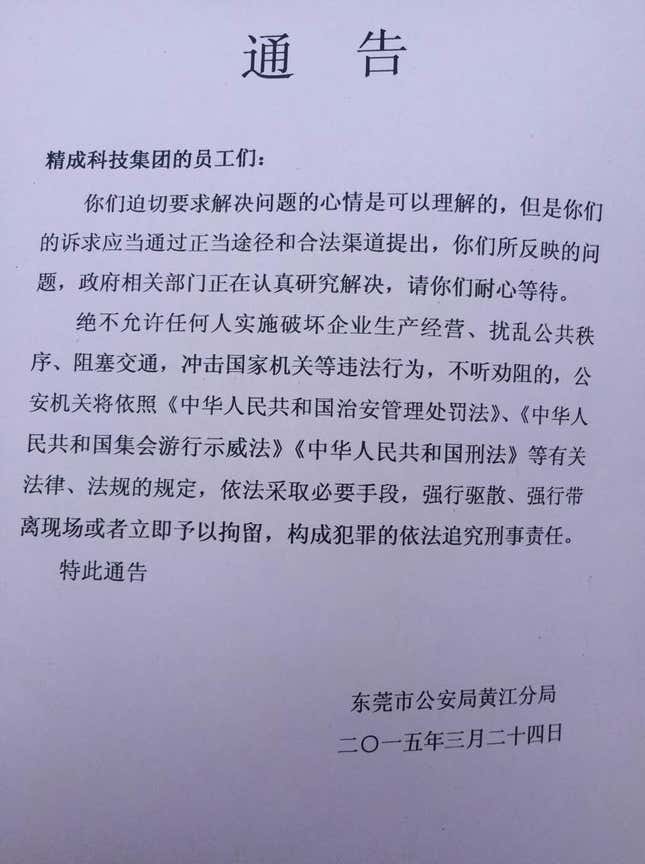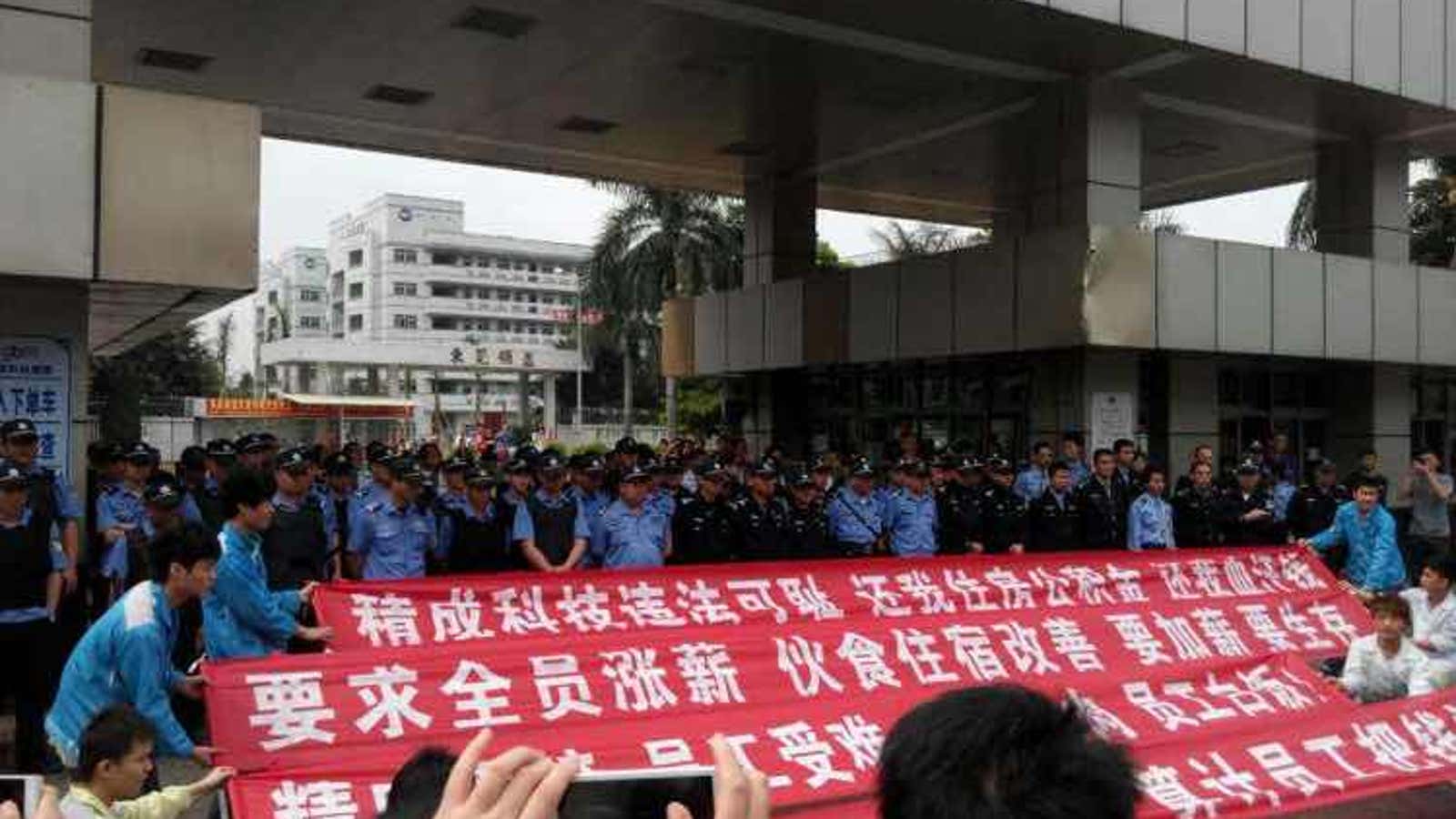A year after the largest factory strikes in decades shook southern China, thousands of workers at the same company, Yue Yuen Industrial Holdings, went on strike again this month, protesting slashed salaries and unpaid benefits.
Protest organizers told Quartz they went back to work late last week, but have set a deadline of tomorrow (March 31) for the company to respond, or they will escalate their protests—a move that could mean tens of thousands of employees stop work, and potential clashes between police and workers. Already, about 100 police were called to the site last week, where they forcibly removed some protesters, and beat at least one, according to interviews with workers and videos from the site.
Strikes are growing across China, as Quartz has reported, as a shrinking labor force and rising inequality collide with a slowing economy. Social media is also helping workers organize.
But Yue Yuen isn’t just any company. Headquartered in Taiwan, it is one of the world’s largest shoe manufacturers, and churns out more than 300 million pairs of sports shoes a year, an estimated one-fifth of the world’s sports and casual-wear shoes. Clients include Nike, Adidas, Timberland, Puma and Converse.
Odds are, there’s a pair of Yue Yuen-made shoes in your closet right now. It takes about 15 workers to make a single pair of athletic shoes, workers say, but most of them will never be able to afford the shoes they work on.
About a year ago, tens of thousands of Yue Yuen workers in Dongguan, Guangdong Province, went on strike demanding their social security payments and salaries, which they said the company was illegally withholding or underpaying. Employees who had worked for the company for a decade or more said they couldn’t afford to retire. “Workers who devoted their best years to the factories are not going to go quietly,” one said last year.
This year, workers from a different Yue Yuen factory in Dongguan are on strike, but their similar demands suggest the widespread and ongoing issues with how the company is treating workers:
What Yue Yuen workers want
Unpaid housing funds: Chinese companies are required to contribute 5% of a worker’s compensation to a “housing fund” that ultimately acts as a secondary pension. Yue Yuen workers say the company has not included overtime in the calculation, shortchanging individuals of thousands of dollars .
Yue Yuen “never pays enough of their share,” a 22-year old protest organizer, named Zhang, told Quartz. He said he has been working for the company for seven years, and the factory owes him around 20,000 yuan ($3,213) in housing funds. The average salary in Yu Yuen is about 3,000 to 3,500 yuan a month.
A new policy housing policy rolled out in Dongguan on March 1 forbids employees from getting any accumulated housing funds in cash if they are quitting their job. But many employees want to quit, Zhang said, and are concerned they’ll never get the funds they are due.
Restored annual bonuses: Yue Yuen workers make more than 20% of their annual salary from an annual bonus that is normally distributed before Chinese New Year, and this year they were dismal. Zhang said his bonus has been cut from 10,000 yuan last year to 4,000 yuan this year, even though he’s doing the same work. “They never explained why,” he said.
Fair union representation: Last year’s strike, which lasted for two weeks, ended with a rare intervention of China’s official All-China Federation of Trade Unions (ACFTU), which promised to reform the company union to protect workers’ rights.
ACFTU also promised to roll out a system of democratic trade union elections across Guangdong province within the next five years, citing Yue Yuen as the nucleus of reform efforts. But since last year, things have only gotten worse.
During last August’s union election at Yue Yuen, independent candidates were not allowed to join. Without an open vote, the same senior manager was re-elected as the president of Yue Yuen trade union.
Zhou Sigen, a senior official of Guangdong’s ACFTU who led a special team to investigate the Yu Yuen strike last year, told Quartz that Yue Yuen’s malfunctioning trade union was the reason behind last year’s production stoppage.
“We believe it was because there is no democratic and representative trade union at Yue Yuen that workers had no one to turn to but starting the protest,” said Zhou. The goal of ACFTU’s planned reform is to “reduce labor disputes as much as possible as well to provide stable environment for production,” he said.
Police are already cracking down
Dozens of police were sent to the Yue Yuen strike last week. In one instance, they beat a protester before carrying him off, a scene that was filmed by other workers at the factory then uploaded to social media. Tian Cheng told Quartz he was sitting in a factory driveway when he was dragged away and then beaten by police (the altercation starts at the 25 second mark):
“After the police released me, they called my supervisor and now I am fired,” Tian said.

Police also distributed a flyer outside the factor last week, essentially warning workers not to strike. It says, in part:
What you have been protesting, the government has already been meeting to discuss. Please wait patiently. No one will be allowed to disturb the company’s normal operations or the public order, block the street, or charging public organizations.
If people don’t follow the law, necessary measures will be taken, including using force to disperse them, and they will be taken away immediately…Those who commit a crime will detained, and charged.
Now workers are waiting to see what the government’s and company’s response will be tomorrow. Last year’s strikes cost Yue Yuen an estimated $27 million.
Pressure on Nike, Adidas, and other foreign firms
So far any response from the big foreign brands whose shoes are made by Yue Yuen has been muted.
“None of the facilities manufacturing product for the Adidas Group has been involved in the recent strikes,” an Adidas spokeswoman told Quartz. Nike did not immediately respond to questions.
Labor lawyers said these companies need to do more. “It is crucial for the corporate giants to truly fulfill their social responsibilities, by affecting the actions of their overseas subsidiaries or contractors,” said Duan Yi, a prominent labor lawyer. Companies can reward or punish irresponsible suppliers by adding or cutting their orders, he said.
“If the corporate giants decline to speak up for a supplier’s factory that is not directly linked to their products, it is not really fulfilling their social responsibilities,” he said.
Last year, the Workers Rights Consortium, a group representing US universities that buy athletic apparel, said they found (pdf) Nike and Adidas’s response to the workers’ 2014 complaints “highly troubling,” especially because they had been sourcing apparel from Yue Yuen for “over a decade.” The companies “must correct the gaps in their auditing practices” that allowed these practices to go unnoticed.
Yue Yuen workers say they has the right to strike, and are acting within the rights protected by mainland law. “We are fighting for our rights without breaking any laws,” Zhang said.
